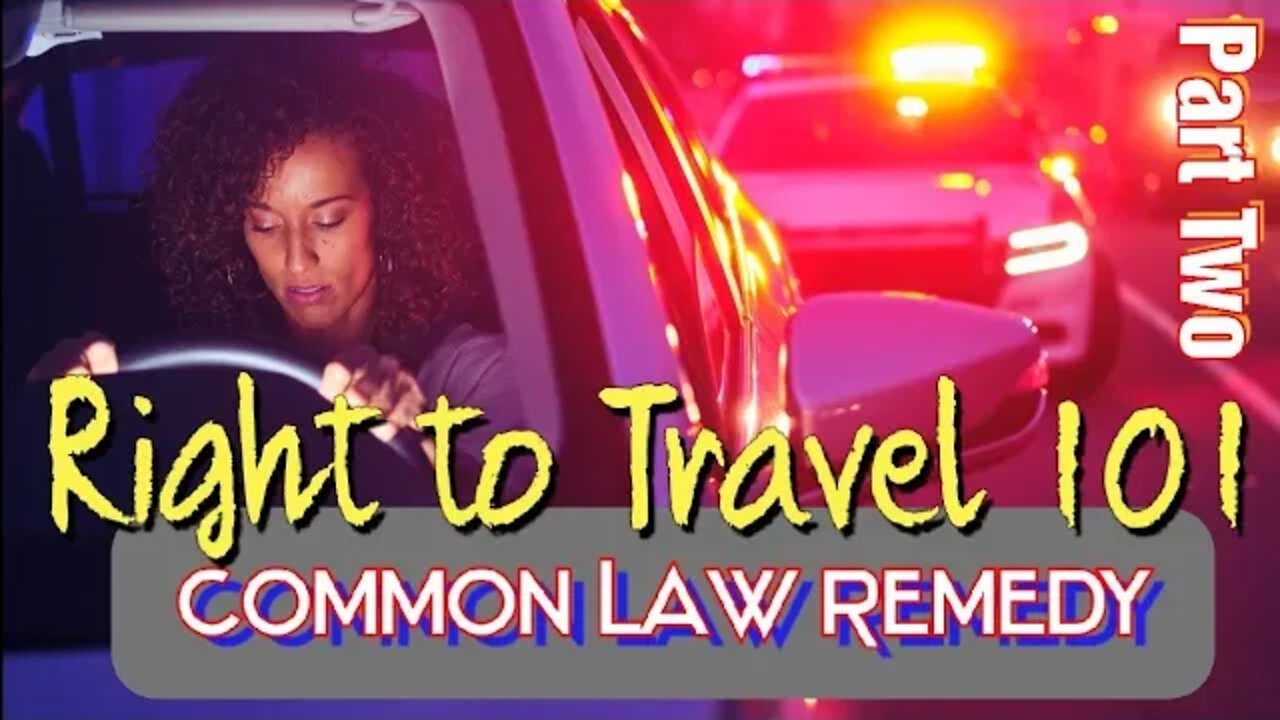Premium Only Content

Common Law Remedy Beat Traffic Tickets The Law On Your Side Part 2
Common Law Remedy to Beat Traffic Tickets - Putting the Law on Your Side
Charter 1-3... Part 2 of 7
What is Common Law? And How to use Common Law in Court for Traffic Tickets.
Part 1 -"Introduction" https://youtu.be/3RvcjVqipWw
Part 2 -"Chapter 1-3" https://youtu.be/LcwHB37T9e4
Part 3 -"Chapter 4 & 5" https://youtu.be/UN_tJmhWCnI
Part 4 -"Chapter 6" https://youtu.be/5bBpyRPc8cQ
Part 5 -"Chapter 7" https://youtu.be/S7bByP8kUJYI'm
Part 6 -"Chapter 8 & 9" https://youtu.be/6nYRdzqlrbs
Part 7 -"Addendum" https://youtu.be/DcFhsfKDLo8
Start reading "Traffic Tickets Common Law Remedy" on Scribd.
Check it out: https://www.scribd.com/doc/399308860
Check out Scribd - the membership for readers! Use my link to sign up and you'll get 60 days free: https://www.scribd.com/ga/47psce
The subject of traffic infractions and the citations that can follow are a relatively recent development in the course of law and law making over the past several hundred years. It has only been within the past one hundred years or so (since the invention and implementation of the automobile in societies) that this phenomenon has occurred.
Statutory law jurisdictions (where law is legislated - written down - and passed into effect and affecting only a certain circumstance that people find themselves in) have over time been source of the majority of these laws. In this regard, it becomes incumbent upon the individual to know the difference and significance between Public Law and Private Law in order to ascertain when, or even if, a law may be applicable to him personally. Most of these laws were written to protect people from unjust circumstances, and in many instances are justified in being enforced. Anyone who breaks a law that is recognized by both the statutory and common law jurisdictions should certainly expect to have to answer for their misdeeds.
However, not every infraction carries with it a cause which violates another person's rights or property. Such incidents are often referred to as "victimless incidents." Yet they are treated by the legal system that most of us are familiar with as though there were an actual victim who was violated. How can this be, when there is no actual cause of action to be decided? In other words, no one putting forth an actual claim upon which relief may be granted. And yet, these "cases" get adjudicated everyday with hardly anyone contesting them.
There is no doubt that municipalities and States are raking in large revenues based on people's ignorance of the law and how it works in matter involving traffic citations. In the case of citations for speeding, only about 3% of these tickets are actually contested. This means that 97% of people pay up! And the legal system counts on this low number of contestants since the courts are already overwhelmed.
The answer to how the legal system "gets away with" being able to charge people and prevail in cases in which there is no actual victim has to do with a little known fact. This fact is no taught in drivers education courses or anywhere else in the education system, and is therefore little known by most people.....
-
 0:58
0:58
Freedom Unchained
1 year agoKeys to "The PLAN" - Why Blockchain NOW Who's on Chain?
510 -
 16:03
16:03
DeVory Darkins
1 day ago $25.84 earned"Shut The F**K UP!" Charles Barkley EXPLODES As DEMS MELTDOWN over Trump
59.9K297 -
 4:44:04
4:44:04
Akademiks
11 hours agoDiddy is RUNNING The Jail! Feds Fear He's Unstoppable even behind Bars! Drake Revenge Era?
96.9K14 -
 5:26:52
5:26:52
Fed Reacts
9 hours agoReaction To Twitch Adpocolypse, Thots, Debating Blacks & Liberals!
62K12 -
 2:12:41
2:12:41
TheSaltyCracker
12 hours agoMSM Implodes After Trump Win ReeEEeE Stream 11-17-24
223K523 -
 4:31
4:31
SLS - Street League Skateboarding
10 days agoFuna Nakayama 3rd Place at SLS Sydney 2024 | Best Tricks
77.7K11 -
 2:15:24
2:15:24
vivafrei
21 hours agoEp. 236: BARNES IS BACK! Election Recap! Trump Nominees! Trump Persecutions - Wha's Next? & MORE!
266K279 -
 6:25:47
6:25:47
SynthTrax & DJ Cheezus Livestreams
20 hours agoDJ Cheezus & DEF JAM Fight for NY on PS2 - Hip Hop Violence and Vibes (1pm PST / 4pm EST)
108K4 -
 2:01:47
2:01:47
Nerdrotic
15 hours ago $14.75 earnedEgypt, Peru and Guatemala Luke Caverns RETURNS! | Forbidden Frontier #082
91.6K10 -
 LIVE
LIVE
Vigilant News Network
16 hours agoFDA Approves Trials for New “Pandemic” Vaccine | Media Blackout
2,029 watching